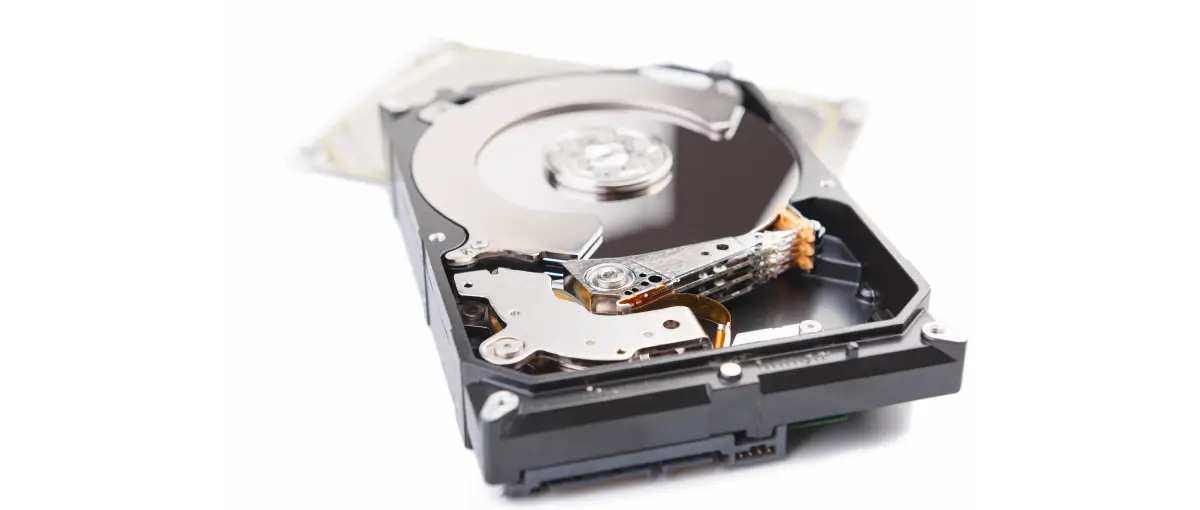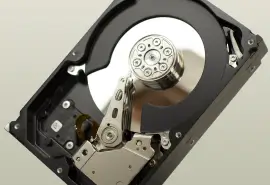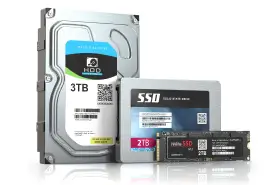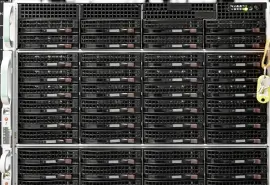Hard disk drives (HDDs) have evolved quite a bit since their invention in 1956. Modern hard drives are much smaller than the first disk storage units and hold more data than ever before. Spinning disks continue to serve as a workhorse for storage infrastructure and personal backups despite their mature status.
One of the most crucial innovations has been the rise of helium hard drives over the past decade.
A helium drive is a disk that is filled with helium gas instead of regular air and hermetically sealed. First introduced by HGST in 2013, the design paved the way for a new line of enterprise hard drives.
This guide explains the benefits of helium drives, the difference between them and other disks, and the unique challenges they present.
What Is a Helium Drive?
A helium drive is a disk filled with helium gas, then sealed to maintain a controlled environment.
Like traditional hard drives, helium disks store digital data on magnetic platters. They also save and load files using mechanical components, such as read/write heads, an actuator arm, and a spindle motor.
The key difference between a helium drive and other HDDs is the internal atmosphere. Helium gas is much less dense than regular air. In fact, helium is the second-lightest element. Its density is roughly seven times lighter than air of average temperature and pressure. Plus, it is a non-flammable element.
As a result, helium drives encounter less friction and turbulence than air-filled disks while rotating at high speeds. Reducing these constraints impacts how the device fares.
The table below compares helium drives with standard disks across multiple categories:
| Helium Hard Drives vs. Traditional Hard Drives | ||
|---|---|---|
| Helium HDD | Device | Traditional HDD |
| More Expensive | Price | Less Expensive |
| Higher | Storage Capacity | Lower |
| Lower | Power Consumption | Higher |
| Cooler | Internal Temperature | Warmer |
| Quieter | Noise Level | Louder |
| More Complex | Recovery Difficulty | Less Complex |
As expected, the improved mechanical and thermal efficiency of helium drives leads to better performance in most metrics.
Pros of Helium Drives
Replacing the air trapped in a hard drive with helium gas offers several benefits, including:
- Larger storage capacities
- Longer lifespan due to decreased wear and tear
- Lower total cost of ownership (TCO)
Reduced drag allows hard drive manufacturers to safely install thinner platters within the housing. More platters in an HDD with the same form factor means greater storage space. This feature is often the headline of helium drives, as hard disks still store most of the world’s data.
Yet, it is not the only advantage.
Helium drives also tend to have longer lifespans than their counterparts. The sealed, lighter atmosphere creates far less resistance for moving parts. In turn, the less turbulent environment lowers mechanical stress and vibrations. Together, these properties extend the typical lifespan of a helium-filled drive.
In addition, helium drives are a more efficient option because there is less friction between their components and gas molecules. The smoother performance reduces noise levels, internal temperatures, and power consumption. Therefore, helium drives can even have a cheaper TCO at scale despite the higher upfront cost to acquire them.
Cons of Helium Drives
Balancing trade-offs is a constant process when assessing storage devices.
Here are the biggest drawbacks of helium hard drives:
- Higher overhead
- Limited consumer applications
- Catastrophic failures
Potential buyers sometimes get sticker shock when they research helium drives. As of June 2025, these disks retail for around $300 for a 14 TB model. That price is more expensive than many people expect to pay for a hard drive. The cost compounds even further if you want to put multiple drives inside of a storage system.
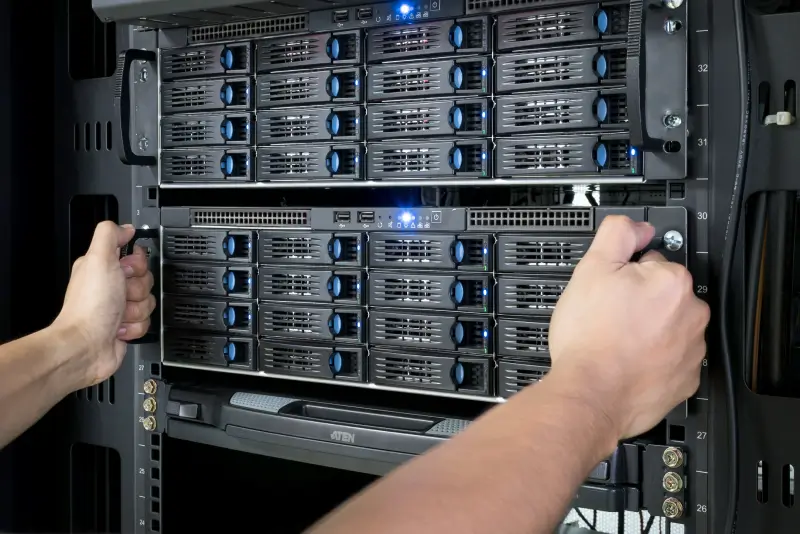
The fact that all helium HDDs are enterprise-class drives is another factor that contributes to their price tags. For example, commercial helium drives with smaller capacities, such as 2 TB or 4 TB, are not for sale. The economic benefits of helium disks are only practical at higher densities. However, most users do not need that much storage space.
Lastly, the intricate design of helium hard drives can cause complex data loss scenarios. But hardware failure is inevitable for all storage devices. When it occurs, helium drives require specialized tools and techniques to retrieve data from their delicate environment. This prospect makes scheduled, secure backups even more essential, which can lead to increased maintenance costs.
Data Recovery Challenges for Helium Hard Drives
As mentioned, helium drives present some obstacles to data recovery services.
Sealing helium inside the case of a hard drive is an engineering challenge in itself. Helium atoms are tiny and move quickly. That means the light gas can diffuse through heavier elements and containers with microscopic gaps. Ensuring helium does not escape from the enclosure is critical. Even a minor leak could lead to erratic behavior and sudden hard drive failure.
To prevent leakage, helium drives are often laser welded shut. This process fuses the metal case at the molecular level, forming an airtight seal. There is no need for screws or slots to dissipate heat. The housing traps helium inside and keeps harmful contaminants outside. A broken seal can damage platters and other sensitive components beyond repair.
So, how do you perform reliable hard drive recovery on a failed helium HDD?

It starts with a state-of-the-art cleanroom. The controlled lab filters airborne particles and dust from the workspace to protect against severe platter damage. You cannot reseal a helium drive once it has been opened. For that reason, these cases allow just one attempt to recover data. Having a skilled technician handle all aspects of the case is one of the biggest benefits of a professional data recovery service.
The hard drive repair experts at Secure Data Recovery have experience restoring files on helium disks. We have developed proven methods to reverse data loss on helium drives made by Western Digital, Seagate, and Toshiba. Our large collection of donor parts, precision tools, and cutting-edge software for low-level access make us an ideal partner in these instances.
Call 800-388-1266 or request help if you need to recover lost data from a helium drive.
Are Helium Hard Drives Worth It?
It depends.
Helium drives offer long-term value to businesses, data centers, content creators, and home users with high storage demands. They have far greater storage capacities than air-filled hard drives. Their improved efficiency often equates to savings on ownership costs as well. Those looking for a scalable solution may also consider helium HDDs to fill that role.
However, many people do not need the amount of storage space that helium drives provide, which frequently starts at 14 TB. Someone with more modest requirements could opt for less expensive disks and fail to notice much of a difference.
Ultimately, the choice between helium drives and other devices depends on the specific circumstance.

